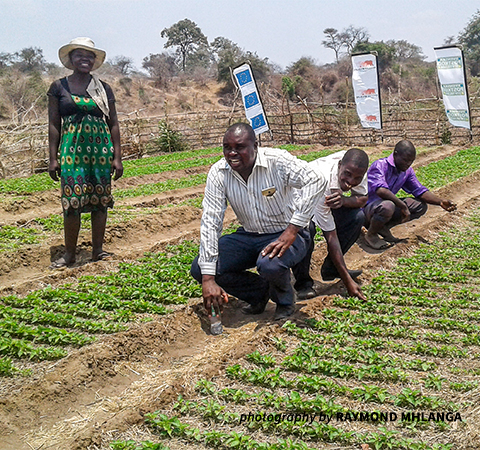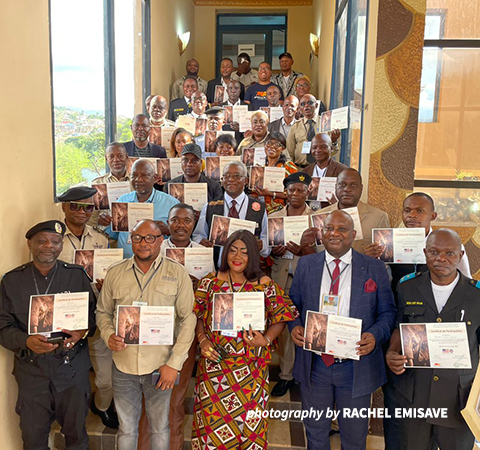Earth Day 2023: Investing in people to invest in our planet

Chili farming prevents human-wildlife conflict in multiple landscapes where AWF works.
The latest report from the Intergovernmental Panel on Climate Change is clear: unless people around the world commit to protecting nature, our planet will reach a point of no return. As dire as the future would be if we do not act now, AWF recognizes that the solutions to climate change and biodiversity loss are at hand. On the bright side, these solutions create a better world for people and our planet—because we will only succeed if our relationship with nature supports our well-being.
As the world celebrates Earth Day under this year’s theme, ‘Invest in our Planet,’ AWF is highlighting our recent work delivering resources to those on the front lines of biodiversity protection. Four months into this pivotal year, AWF has already made strides in realizing this vision across several critical African landscapes.
Developing sustainable economies
To protect nature, one of the most critical questions is how to put in place economic systems that empower people and allow natural systems to recover and thrive. AWF works with communities in and around vital ecosystems on solutions that allow those communities to reap rewards from the conservation and sustainable use of nature.
In the Bili-Uele landscape in the Democratic Republic of the Congo, AWF works with communities to address their needs and the health of the Congo Basin rainforest. For example, AWF holds workshops on sustainable agriculture practices like field rotation as well as trainings on product marketing. By drawing on these skills, farmers are now making more income while putting less of a strain on a rainforest dubbed the world’s second lung thanks to its power as a carbon sink.
And recently, AWF helped train 45 women in the landscape on constructing fuel-efficient stoves, which saves time and effort while cooking as well as reducing the strains of harvesting fuelwood from the forest.

Farmers who plant chili to deter wildlife can also make income from the crop.
In Zimbabwe’s Mbire District, an area with abundant wildlife, the community has faced instances of elephants wandering onto their land and trampling their crops, injuring people, and even killing some. This kind of human-wildlife conflict has posed a barrier to the community’s capacity to live alongside wildlife.
To remedy this issue, AWF works with communities in Mbire District to empower them to manage their natural resources and address human-wildlife conflict. In March, alongside several key partners, AWF engaged 574 community members in seven wards, holding awareness sessions aimed at promoting natural resource protection, restoration, and management. The sessions were successful thanks to AWF’s partnership with the Swedish International Development Agency, Environmental Management Agency, Forestry Commission, Zimbabwe Parks and Wildlife Management Authority, Mbire Rural District Council, AGRITEX, and the District Development Fund.
The trainings offered solutions to deter wildlife peacefully, such as planting chili, a crop that repels elephants. At the same time, chili offers a profitable source of income, making the crop a multi-purpose solution.
When it comes to conserving ecosystems on which the entire planet depends, success will never be achieved without local buy-in. On the contrary, these African-led solutions demonstrate how living well and living with nature can go hand in hand.
>>Learn how supporting communities helps Ethiopian wolves
Upskilling and equipping nature’s protectors
Wildlife authorities play an integral role in stewarding nature in protected areas across Africa, yet the majority of these protected areas are underfunded. AWF supports rangers with training, equipment, and infrastructure investments to make sure they have what they need to manage wildlife.
In landscapes like Zimbabwe’s Mid-Zambezi Valley, AWF provides training and equipment to help rangers collect and draw lessons from geospatial data. Just recently, AWF began supporting the expansion and renovation of the Mkanga Ranger Field Station in the valley. Previously too small to accommodate 27 rangers and without water, the station did not meet the necessary working conditions. The station now has access to water after more than 30 years. This work builds on over US $10 million we have invested in the landscape since 2018.

Law enforcement officers participated in a capacity-building workshop in Matadi.
In the Democratic Republic of the Congo, AWF’s Counter Wildlife Trafficking team holds regular trainings for law enforcement working in high-volume ports to crack down on wildlife trafficking. Most recently, AWF and the Institut Congolais pour la Conservation de la Nature (ICCN) held workshops on improving wildlife prosecution for 25 officers working in Kinshasa’s airports and ports. The participants learned about identifying wildlife products and how traffickers camouflage them, upholding human rights, arrest and trial procedures, forensic science, and more.
Later that month, the Counter Wildlife Trafficking team continued the workshop series for 27 more officers based in the ports of Matadi. The participants came away with a strong sense of what it will take to deter wildlife traffickers from smuggling their contraband through Matadi.
“We are sure that the knowledge we have gained will make a difference,” said Henri Bokulu, staff of the Office Congolais de Controle in Matadi, speaking to AWF on the impact of the workshop. “Don't get tired of coming to bring us knowledge. We are waiting for you with open arms, aware that by the time you come here again, today's training will have already paid off."
Preventing wildlife trafficking is a critical piece of the puzzle to maintain the DRC’s rich biodiversity, especially in the Congo Basin rainforest.
>>Learn how AWF is upskilling rangers on geospatial tech
Opening opportunities for young people
Africa is a young continent, with over half of its population under 25. Since the early years of AWF’s six-decade history, we have recognized the importance of kickstarting driven young African leaders’ careers and fostering students’ conservation ethic. Early-career African leaders trained and supported by AWF have moved on to influential positions to make a difference in conservation. And AWF’s early involvement with the Wildlife Clubs of Kenya helped spark a movement across Africa and even other continents.
Since 2011, AWF’s Classroom Africa program has worked with primary schools to provide a quality education for students living near key landscapes. The program also aims to deepen their appreciation for conservation, giving students a chance to see wildlife up close and appreciate their relationship with nature. In February, AWF handed over the newly-constructed Manyara Ranch Primary School to the local government in Tanzania. Around 1,050 students will now be able to take advantage of the relocated school for a quality education.
Our mission to build capacity among future conservationists and policymakers continues today, as just this month, AWF announced the second cohort of 15 Charles R. Wall Young African Policy Fellows from all over the continent for a year-long advocacy training program. The program aims to unlock opportunities for these young professionals to make a lasting change.
Just this week, AWF additionally welcomed 15 more fellows to the first cohort of our revamped Charles R. Wall Conservation Leadership and Management Fellowship. The program, which is the second arm of the Charles R. Wall Leadership Programs, offers a vigorous curriculum that aims to build their leadership and management skills to drive systemic change in their respective fields.
>> Read more: Campaign rallies young Africans to implement biodiversity framework
Rachel Emisave and Ndanatsiwa Tagwireyi contributed to this article.